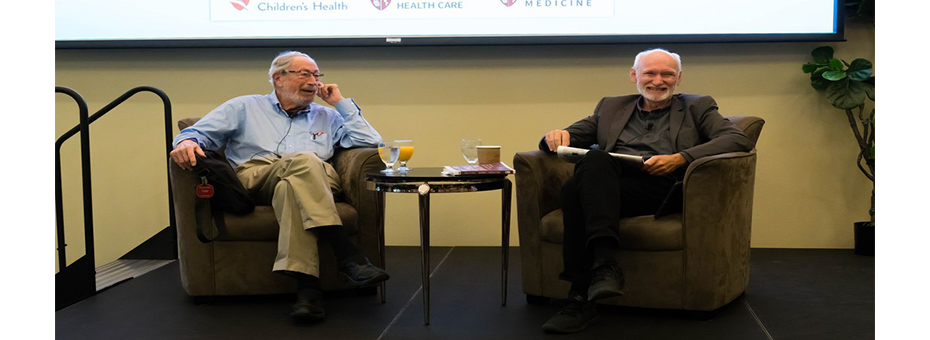Recently LEI released an edited dialogue between famed thinkers Edgar Schein and our own John Shook that took place last year (for the second year in a row) at the Lean Healthcare Academic Conference at Stanford. This lively and wide-ranging conversation delved deeply into the nature of coaching–on the dynamics of what can be a challenging and ever-changing relationship that takes place at many simultaneous levels, and which requires a mindfulness about the systemic aspects of any guidance.
For a fuller intro from John Shook, and a link to access the full dialogue, you can read his his latest letter A Humble Conversation.
In the meantime, here are some edited quotes from their talk:
Edgar: “The key issue I’ve discovered in recent years is the problem of access and validity of information. The biggest problem in the safety arena is that people know stuff that they either choose not to reveal or they are scared to reveal. What really pushed me into this level one, level two relationship is that the normal transactional, professional relationship does not really make the parties safe to speak up…
“My passion for getting past transactional relations into more personal relations is the very pragmatic argument: get people to speak up and tell you the truth so that you know what you’re really dealing with. That’s the ultimate logic.”
John: “To “ask why” is one of the most famous of lean practices. Some of my own most powerful learning came from a very humble teacher, a humble leader. Mr. Fujio Cho, who I happened to see just last week, was the chairman of Toyota and was my boss many years ago. He’s long been famous in the lean community, and is famous for advocating that to solve problems or make improvements, we should “go see” – leaders should go to the gemba. If there’s one Japanese term that I like to use even in an English context, it is gemba. As a word, “gemba” captures a certain spirit of empiricism that is essential to lean thinking. As Mr. Cho famously said: “Go see, ask why, show respect.” Ask why really means to tap into your inner curiosity. Maintain a spirit of scientific inquiry.
“So, at the gemba, the first question we ask is not ‘why?’. Starting off with ‘why’ questions starts to take you down a certain path and you will just tell me what you already think about why something happened. Rather, ask what is happening. What is happening with the situation? The longer I can stay in ‘what,’ the more deeply I can understand the problem situation. Then we can get into why, which is a diagnostic question, with a deeper, more accurate and objective grasp of the situation. So, in a totally natural way, this typology of questions, leading the way with humble inquiry, I can more accurately understand what’s really going on. When we transition to diagnostic inquiry – asking why something is happening – that’s when we start to generate ideas and hypotheses, and solicit insights from the team. There’s a place for that, but going through the sequence of the typology, I think, is something that’s very learnable. With just a little training and some reinforcement we can learn to do those things.”
Edgar: “What we discovered in the T-group was that to get people to tell you how they feel about what’s going on requires suspending a lot of the cultural rules that we normally live by…This was the first real discovery of how organizations are complex systems. Just fixing the packaging line without changing the production line and changing the sales and marketing line did not allow improvement. It could improve a little bit, but the rest of it was still in limbo.
John: “Toyota didn’t invent the notion of socio-technical systems. But I think Toyota’s accomplishments are useful for us in how they gained insights into this riddle of how the social and technical can be effectively combined. It’s frustrating that we tend to take sides and emphasize one side or the other. What’s important is really how we go about combining the technical with the social…What we really mean by respecting people is, more than anything, how we develop capabilities. How we develop capabilities as a group is through experiential learning.”
“In some ways I see in TPS or lean, is that not just assistance to effectively execute things, but as a system that is intended to identify weaknesses. It’s not just a system to win the game, it’s a system to identify weaknesses. To identify my weaknesses and consider how I can improve.”
These and other questions regarding the nature of coaching will be explored at our annual Lean Coaching Summit (in Seattle July 18-19).





